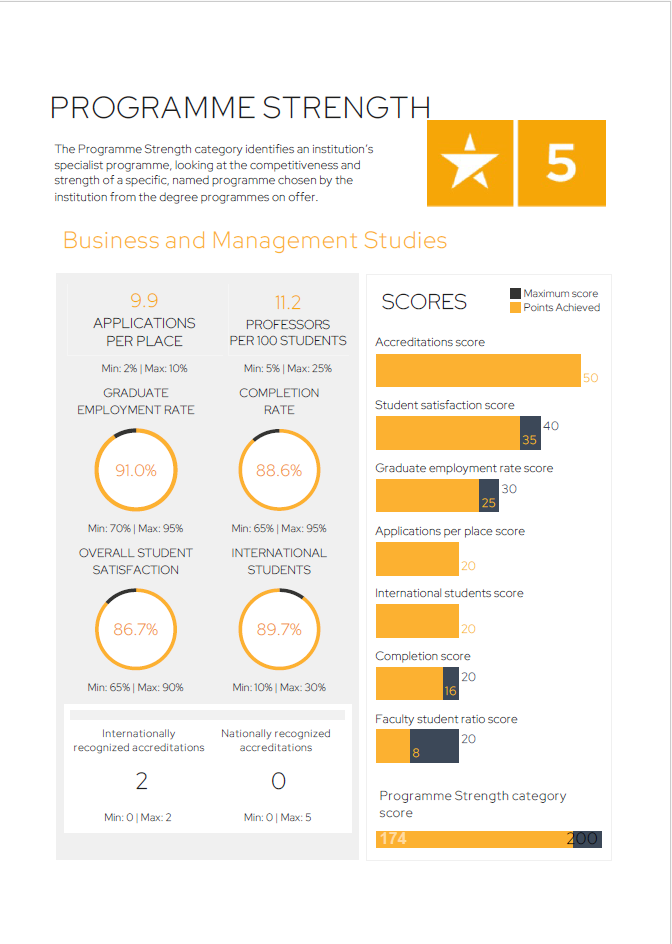

We are proud to be rated 5 stars by QS TopUniversities Ranking, reflecting our commitment to student success and satisfaction. An impressive 91% of our graduates secure employment within six months of graduation, and 87% of our students express high satisfaction with our services and study programs. With 88% of our students graduating on time, our system is designed to support timely and effective education. Additionally, we are proud that 89% of our student body is made up of international students, enriching our campus with diverse perspectives and experiences.

Rated 5 stars in Education by
QS TopUniversities
This rating is recognized by over 130 countries worldwide, and fewer than 2% of universities globally have achieved a 5-star rating. This distinction places us among the top 2% of universities in the world. We are proud to have received a 5-star rating from QS, affirming our status as one of the leading academies globally.
QS Rating of TopUniversities
We are rated Excellent (5 stars)

This rating is valid until the end of 2029
The QS Rating is widely regarded as one of the most reliable and respected global educational ranking systems. Renowned for its rigorous methodology and comprehensive assessment criteria, the QS rankings provide invaluable insights into the quality and reputation of institutions worldwide.
That means 5 stars:
-
"91% of our graduates secure employment within six months of graduation, demonstrating the effectiveness and relevance of our programs."
-
"86.7% of our students express high satisfaction with the study programs we offer, reflecting our commitment to providing quality education."
-
"88.6% of our students complete their study program on schedule, as planned by our academic team."
-
"89.7% of our students are international Students."
-
etc...

Graduate Employment Rate
91%
Completion Rate
88%
International Students
89%
Student Satisfaction
87%



QS worlwide
-
India: The Ministry of Human Resource Development (now the Ministry of Education) has referenced QS rankings in its assessments and reports, indicating their acceptance and recognition of QS as a credible source for evaluating university performance.
- Japan: The Ministry of Education, Culture, Sports, Science and Technology (MEXT) has acknowledged QS rankings in its efforts to internationalize Japanese universities and enhance their global competitiveness.
-
Malaysia: The Ministry of Higher Education utilizes QS rankings to set benchmarks for local universities, aiming to elevate their status in global higher education.
-
Saudi Arabia: The Ministry of Education references QS rankings to assess and improve the performance of its universities on the global stage.
-
United Arab Emirates: The UAE's Ministry of Education considers QS rankings in its strategic planning to enhance the quality and reputation of its higher education institutions.
-
China: The Ministry of Education has shown recognition of QS rankings, encouraging universities to improve their standings as part of broader educational reforms.
-
Singapore: The Ministry of Education refers to QS rankings to gauge the international standing of its universities and to inform policy decisions.
-
South Korea: The Ministry of Education acknowledges QS rankings in its initiatives to boost the global competitiveness of Korean universities.
-
Brazil: The Ministry of Education considers QS rankings when formulating policies to enhance the quality and international presence of Brazilian universities.
These examples illustrate that QS rankings are recognized and utilized by various countries' ministries of education to inform policy decisions, set benchmarks, and drive improvements in higher education.
-
The Kuwait Ministry of Higher Education refers to QS rankings in their evaluation and accreditation processes for universities, particularly when students apply for scholarships to study abroad.
-
The Oman Ministry of Higher Education, Research, and Innovation recognizes QS rankings to support policies that encourage local universities, to improve their global visibility.
-
The Israeli Ministry of Education and the Council for Higher Education acknowledge global ranking systems like QS to evaluate the international competitiveness of Israeli institutions
-
The Jordan Ministry of Higher Education and Scientific Research encourages local universities to improve their standings in QS and other international rankings to attract more international students and enhance regional competitiveness.
-
The Bahrain Higher Education Council incorporates QS rankings in its strategies for elevating the status of Bahraini universities in the Gulf region and globally.
-
The Turkish Ministry of National Education and the Council of Higher Education (YÖK) have adopted QS rankings as a measure for advancing the international reputation of Turkish universities.
-
The Indonesian Ministry of Education, Culture, Research, and Technology uses QS rankings as a guideline to push its universities, such as Universitas Indonesia, to achieve global recognition.
-
Nigeria: The National Universities Commission references QS rankings to benchmark and improve the standards of Nigerian higher education institutions.
-
Mexico: The Secretariat of Public Education considers QS rankings in its strategies to elevate the international profile of Mexican universities.

